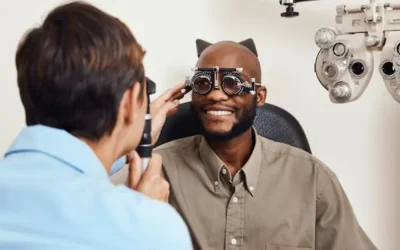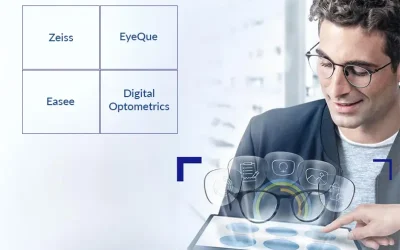If you’re wondering whether an annual eye test is really necessary—yes, it absolutely is. An annual eye exam is a critical preventive measure that can help detect hidden eye conditions early, often before any symptoms appear. But it doesn’t stop there, these tests can also uncover signs of serious health issues like diabetes, high blood pressure, and even neurological conditions. Think of it as a yearly health check-up for your eyes and overall well-being.
The Preventive Power of Annual Eye Exams
Prevention is key when it comes to safeguarding your vision. Annual eye exams not only update your prescription but serve as an early-warning system for potential eye diseases and other health conditions.
Early Detection Saves Sight
Routine eye exams go beyond just checking your vision. They’re designed to detect serious conditions that can silently progress until it’s too late.
Glaucoma: The Silent Thief of Sight
Glaucoma, often without early symptoms, causes increased intraocular pressure that can damage the optic nerve. Early detection through regular exams allows for prompt treatment, preserving your sight over time.
Cataracts: When Vision Gets Cloudy
The gradual clouding of the lens due to cataracts can impair your vision and quality of life. Annual exams help monitor these changes, ensuring you receive timely advice on management or surgery when needed.
Macular Degeneration: Protecting Your Central Vision
Age-related macular degeneration (AMD) affects your central vision—the crucial part of your sight for reading and recognizing faces. Regular check-ups can catch AMD early, opening the door to treatments that slow its progression.
Diabetic Retinopathy: Keeping Diabetes in Check
For those with diabetes, diabetic retinopathy is a serious risk. Routine dilated eye exams can spot the early damage to retinal blood vessels, ensuring better control of the condition and prevention of permanent vision loss.
Beyond the Eyes: Overall Health Insights
Your eyes can be windows into your overall health. During a comprehensive exam, optometrists can detect subtle indicators of other health issues that might not show symptoms elsewhere.
Detecting Systemic Diseases Through Your Eyes
- Hypertension and High Cholesterol: Changes in the retinal blood vessels can hint at cardiovascular issues.
- Neurological Disorders: Inflammation of the optic nerve might signal neurological conditions needing immediate attention.
- Metabolic Issues: Early indicators of diabetes and other metabolic syndromes often appear in the eye, enabling early lifestyle changes or treatments.
Technological Innovations in Eye Care
As technology advances, so do the methods for detecting and treating eye conditions. Modern innovations are making eye exams faster, more accurate, and even more informative about your overall health.
Advanced Diagnostic Tools
New imaging techniques like Optical Coherence Tomography (OCT) and digital retinal photography provide high-resolution views of your eye’s interior. These tools help spot diseases in their earliest stages, sometimes even before you experience any vision loss.
Artificial Intelligence and Telemedicine
AI-driven diagnostic software is now being integrated into eye care, enhancing the accuracy of diagnosis and even predicting the progression of certain eye diseases. Telemedicine platforms allow patients to get preliminary assessments and follow-up consultations online—making eye care more accessible than ever.
Wearable Technology and Smart Devices
The rise of wearable devices that monitor eye health is promising. These smart tools can track eye movement and detect fatigue or strain, providing data that can lead to personalized recommendations for reducing digital eye strain—a common issue in today’s screen-dominated world.
Debunking Common Myths About Eye Exams
Despite the clear benefits, several misconceptions about eye exams persist. Let’s clear up some of these myths so that you feel confident about scheduling your annual appointment.
Myth 1: “I’m Young and I Have Perfect Vision, So I Don’t Need an Eye Exam.”
Fact: Even if you have perfect vision, many eye conditions do not cause noticeable symptoms in their early stages. An annual exam can detect these silent threats before they escalate into serious problems.
Myth 2: “Eye Exams Are Painful and Time-Consuming.”
Fact: Modern eye exams are quick, painless, and non-invasive. Most appointments last less than an hour and provide peace of mind that is well worth the short time investment.
Myth 3: “I Can Rely on Over-the-Counter Glasses or Online Tests.”
Fact: While online vision tests can be convenient, they do not replace a comprehensive eye exam by a qualified professional. Only a full exam can detect conditions such as glaucoma, cataracts, and systemic issues that could be affecting your eyes.
Myth 4: “Eye Exams Only Check Vision, Not Overall Health.”
Fact: Your eyes can reveal a lot about your health beyond just sight. A thorough exam can indicate issues like high blood pressure, diabetes, and even neurological problems.
Expert Recommendations on Eye Exam Frequency
The frequency of your eye exams should be tailored to your age, lifestyle, and health status. Experts offer clear guidelines to ensure that everyone receives the best possible care.
Guidelines for Different Age Groups and Conditions
- Children (3–5 years): Initial screening to check for developmental issues.
- Teens & Adults (18–39 years): Every two years is generally sufficient if you’re healthy; however, those wearing corrective lenses or with a family history of eye conditions should consider annual exams.
- Adults (40–64 years): Annual exams are ideal to monitor the onset of age-related changes.
- Seniors (65+ years): More frequent, often annual or biannual, examinations due to increased risks.
- People with Diabetes or Hypertension: Annual dilated eye exams are essential to managing these conditions effectively.
Cost-Effectiveness: Financial and Health Benefits
Investing in an annual eye exam can save you significant money and prevent a host of difficulties in the long run.
Early Detection Saves Money and Prevents Hardships
Preventive care is one of the most cost-effective strategies in health care. Early detection of eye conditions reduces the need for expensive treatments or surgeries later on. In addition to lowering medical expenses, preserving your vision also helps maintain your quality of life and productivity—sparing you from indirect costs like lost workdays or long-term care expenses.
Conclusion
An annual eye test is much more than a routine check-up, it’s an essential investment in your overall health. Not only can regular exams prevent irreversible vision loss, but they can also serve as early detectors of systemic health issues, benefiting from the latest technological advancements in eye care. Don’t wait until you notice a problem, make that appointment today and give your eyes the care they deserve. Your sight and health are worth it.
FAQ: Your questions answered
Do I really need an eye exam if I have perfect vision?
Absolutely. Many eye diseases do not show symptoms until they are advanced. Regular eye exams help catch these silent conditions before they cause significant damage.
How does technology enhance the effectiveness of eye exams?
Innovations like OCT imaging, AI diagnostics, and telemedicine provide more precise detection, making it easier to identify early signs of eye diseases and overall health issues.
Can an annual eye exam help in detecting diseases beyond vision problems?
Yes, changes in your eyes can reveal systemic issues such as high blood pressure, diabetes, and even neurological disorders.
How often should I schedule my eye exams?
Generally, every 1–2 years is recommended for healthy adults. However, those with risk factors or existing conditions should follow their optometrist’s advice, which might include more frequent visits.
What are some common myths about eye exams that I should ignore?
Misconceptions such as “I’m young and don’t need an exam” or “Online tests are enough” are false. Comprehensive eye exams provide critical, in-depth health insights that simple tests can’t offer.



